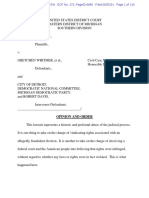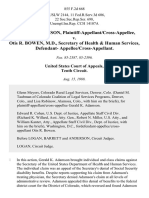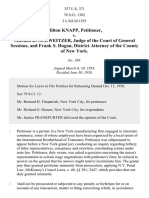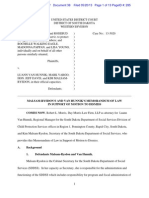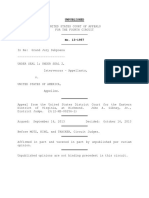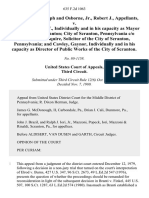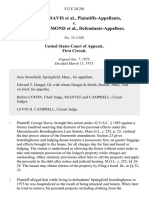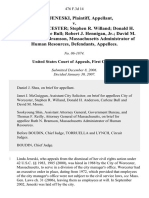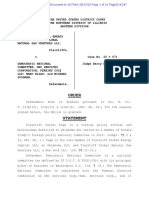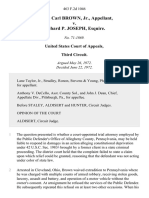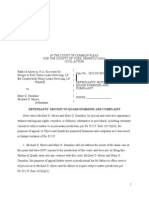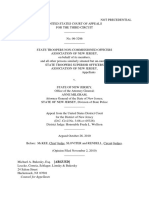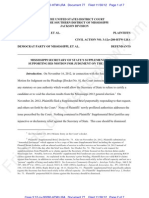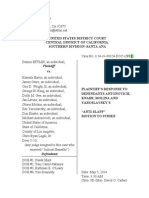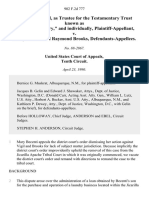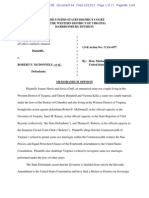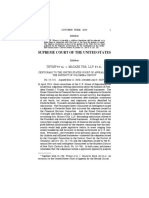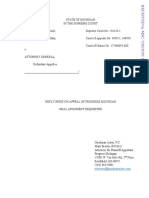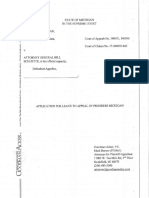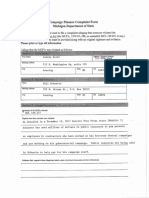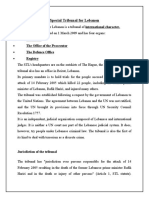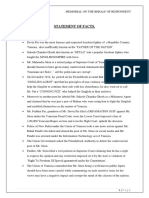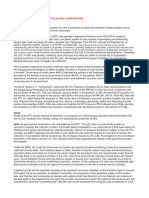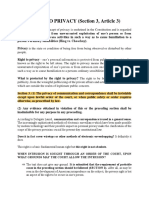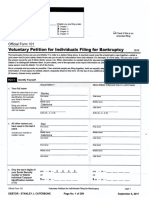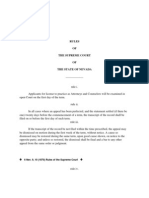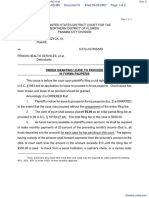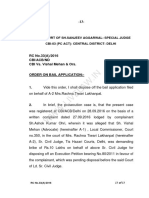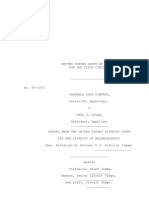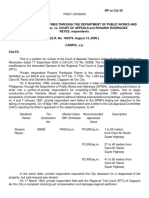Professional Documents
Culture Documents
1.23.17 Order Re Motion To File Amicus Curiae
Uploaded by
progressmichiganOriginal Title
Copyright
Available Formats
Share this document
Did you find this document useful?
Is this content inappropriate?
Report this DocumentCopyright:
Available Formats
1.23.17 Order Re Motion To File Amicus Curiae
Uploaded by
progressmichiganCopyright:
Available Formats
2:16-cv-10277-DML-SDD Doc # 139 Filed 01/23/17 Pg 1 of 10
Pg ID 7188
UNITED STATES DISTRICT COURT
EASTERN DISTRICT OF MICHIGAN
SOUTHERN DIVISION
CONCERNED PASTORS FOR SOCIAL
ACTION, MELISSA MAYS, AMERICAN
CIVIL LIBERTIES UNION OF MICHIGAN,
and NATURAL RESOURCES DEFENSE
COUNCIL, INC.,
Plaintiffs,
Case Number 16-10277
Honorable David M. Lawson
v.
NICK A. KHOURI, FREDERICK HEADEN,
MICHAEL A. TOWNSEND, DAVID
MCGHEE, MICHAEL A. FINNEY,
BEVERLY WALKER-GRIFFEA, NATASHA
HENDERSON, and CITY OF FLINT,
Defendants.
_______________________________________/
OPINION AND ORDER DENYING MOTION BY ATTORNEY GENERAL
BILL SCHUETTE TO FILE AMICUS CURIAE BRIEF
Michigan attorney general Bill Schuette has filed a motion for leave to file a friend of the
court brief addressing a pending motion to dissolve a preliminary injunction. The Court had entered
the preliminary injunction on November 10, 2017 ordering the State defendants (the Michigan state
treasurer and the members of the Flint Receivership Transition Advisory Board (RTAP)) and the
Flint defendants (the City of Flint and its city administrator) to ensure that Flint residents had
properly installed and maintained faucet water filters, and, failing that, to deliver bottled water to
households. The State defendants and the Flint defendants have moved to dissolve the injunction
on several grounds.
-1-
2:16-cv-10277-DML-SDD Doc # 139 Filed 01/23/17 Pg 2 of 10
Pg ID 7189
General Schuettes motion is problematic for several reasons. First, he cites as authority for
filing the motion a Michigan statute that authorizes the attorney general, when requested by the
governor, a branch of the legislature, or on his own initiative, to appear for the people of the
state in a court case in which the people of this state may be . . . interested. Mich. Comp. Laws
14.28. The problem with relying on that statute is that the attorney general, in the persons of
assistant attorneys general Michael Murphy, Richard Kuhl, and others, has already appeared in this
case on behalf of the state defendants. Second, General Schuettes proposed friend of the court brief
takes a position diametrically opposed to that advanced by his other deputies and assistants.
Allowing him to do so likely would create an ethical conflict that could delay the ultimate
disposition of this case, because it would raise the specter of disqualification of his entire office from
participating on behalf of any party in the case. See People v. Doyle, 159 Mich. App. 632, 406
N.W.2d 893 (1987). Third, the proposed brief does not raise any arguments that have not been
addressed by the parties presently before the Court. Fourth, there is a technical fault with the
motion, as it violates Rule 11 of the Courts electronic filing rules. The Court finds no good reason
to permit the filing.
I.
In the motion to dissolve the injunction filed by the attorney generals office on behalf of the
state defendants, those parties argue that the Court should vacate its preliminary injunction because
there are no ongoing violations of the monitoring or treatment requirements of the Safe Drinking
Water Act (SDWA), and they repeat their argument that delivery of bottled water will harm the Flint
water system recovery by slowing the distribution of orthophosphate in the service lines. The
proposed friend of the court brief that the same attorney general wants to file urges the Court to
-2-
2:16-cv-10277-DML-SDD Doc # 139 Filed 01/23/17 Pg 3 of 10
Pg ID 7190
maintain the injunction in place, because the Flint water system still is in violation of the SDWAs
Lead and Copper Rule, and distribution of bottled water is necessary to protect the Flint residents.
These arguments parrot many of the points already made by the plaintiffs on this record. And they
are obviously adverse to the State defendants position.
A well-known and fundamental tenet of attorney ethics states that [a] lawyer shall not
represent a client if the representation of that client will be directly adverse to another client. Mich
R. Prof. Cond. 1.7(a). There are exceptions to this rule, such as when the lawyer reasonably
believes the representation will not adversely affect the relationship with the other client, or when
each client consents after consultation. Ibid. Neither applies here.
As the attorney general, Mr. Schuette has the duty to to prosecute and defend all suits
relating to matters connected with the various departments of state, including, as in this case, the
treasurer or the auditor general. Mich. Comp. Laws Ann. 14.29. Discharging that duty, the
attorney general appeared on behalf of the State defendants the state treasurer and the members
of the RTAB to defend the present lawsuit. As part of that defense, the attorney general opposed
the plaintiffs motion for a preliminary injunction, and after it was granted, filed a notice of appeal,
and moved to stay the injunction in this Court and the court of appeals. After both stay motions
were denied, the attorney general moved in this Court to dissolve the injunction.
It is that very motion the one to dissolve the preliminary injunction that Mr. Schuette
seeks to address with his friend of the court brief. And in that brief he wants to advocate a position
that is directly adverse to that taken by his clients the State defendants who brought the
motion to dissolve the injunction. It is true that an assistant different than Michael Murphy is the
one who wants to file the friend of the court brief, and that it came from the attorney generals
-3-
2:16-cv-10277-DML-SDD Doc # 139 Filed 01/23/17 Pg 4 of 10
Pg ID 7191
office of special counsel, but that does not matter. Another well-known tenet of attorney ethics
states that [w]hile lawyers are associated in a firm, none of them shall knowingly represent a client
when any one of them practicing alone would be prohibited from doing so by Rule[] 1.7. Mich R.
Prof. Cond. 1.10(a).
The reference to a firm in Rule 1.10(a) is not limited to private law firms. Under the
Michigan ethics rules, a government law department is treated as a single firm. Barkley v. City of
Detroit, 204 Mich. App. 194, 208, 514 N.W.2d 242, 248 (1994) (referencing Rule 1.10(a), and
stating that [w]hile government lawyers are not mentioned in the rule, it appears that, at least in
some circumstances, this rule applies to them); see also State of Bar Mich. Standing Comm. on
Profl Ethics, Informal Op. RI-43 (1990) (stating that a prosecutors office does constitute a firm
for the purposes of these Rules). That principle applies with special force when the conflict
originates with a government lawyer in a supervisory capacity, such as Mr. Schuette. See Doyle,
159 Mich. App. at 645, 406 N.W.2d at 899.
It is also noteworthy, perhaps, that the motion for leave to file the friend of the court brief
was filed by the attorney generals office of special counsel. Although the status of that office is
not readily apparent, it is clear that the lawyers assigned to it report directly to the attorney general.
They are not independent special assistant attorney[s] general, a position recognized by the state
legislature. See Mich. Comp. Laws 333.16237(2). The important feature of the latter position is
that [o]nce appointed, an independent special assistant attorney general is not subject to the control
and direction of the Attorney General. Attorney Gen. v. Michigan Pub. Serv. Commn, 243 Mich.
App. 487, 491, 625 N.W.2d 16, 20 (2000).
-4-
2:16-cv-10277-DML-SDD Doc # 139 Filed 01/23/17 Pg 5 of 10
Pg ID 7192
It is beyond debate that the rules of professional conduct do apply to the office of attorney
general. Id. at 516, 625 N.W.2d at 33; see also People v. Waterstone, 486 Mich. 942, 942, 783
N.W.2d 314 (2010) (order) (recognizing that the Attorney General is subject to the rules of
professional conduct). Several courts have recognized that state attorneys general occasionally are
called upon to represent different divisions of government in the same action, and such dual
representation is not necessarily conflict-provoking. See Attorney Gen. at 509-16, 625 N.W.2d at
29-33 (collecting cases). However, the rules do recognize a clear conflict of interest when the
Attorney General acts as a party litigant in opposition to an agency or department that she also
represents in the same cause of action. Id. at 516, 625 N.W.2d at 33.
It is not clear who it is that Mr. Scheutte purports to represent through his friend of the court
filing. It may be the people of this state, see Mich. Comp. Laws 14.28, or it may be himself.
It is clear that he seeks to appear in his own name and office. He has, of course, no official stake
in the matter (except, of course, arising from his duty to represent the State defendants), although
perhaps he has a personal one. Either way, there is an obvious conflict, and if it is the latter, the
conflict is more egregious, as he means to take a position adverse to his clients in the same lawsuit
while advancing his own, personal position.
II.
In addition to the actual conflict, the proposed filing creates a positional conflict. As a
general matter, a positional conflict may arise when a lawyers advocacy of a legal position in one
case could have negative consequences for a second client in an unrelated matter. ABA/BNA Laws.
Man. on Prof. Conduct 51:117. Positional conflicts also are prohibited by Rule 1.7(a), see ABA
Model R. Prof. Cond. 1.7(a) cmt. 24 (noting that a conflict of interest exists when there is a
-5-
2:16-cv-10277-DML-SDD Doc # 139 Filed 01/23/17 Pg 6 of 10
Pg ID 7193
significant risk that a lawyers action on behalf of one client will materially limit the lawyers
effectiveness in representing another client in a different case.), and by Rule 1.7(b) (which prohibits
a lawyer from representing a client where the representation of that client may be materially limited
by . . . the lawyers own interests . . . unless: (1) the lawyer reasonably believes the representation
will not be adversely affected; and (2) the client consents after consultation.). The general rule is
that a lawyer ordinarily may take inconsistent legal positions in different courts at different times,
but that a conflict is presented when there is a substantial risk that a lawyers action in one case will
materially and adversely affect another client in a different case. ABA/BNA Laws. Man. on Prof.
Conduct 51:118 (quoting Restatement (Third) of the Law Governing Lawyers) 128, cmt. f
(2000)).
Here, the positions taken by the attorney general manifestly are inconsistent, and the
positional circumstances are aggravated because he has asserted them in the same case.
III.
The conflict introduced in this case by General Schuette potentially presents new
complications. The State defendants understandably may have reason to doubt the loyalty they
have a right to expect from their attorneys. See Barkley, 204 Mich. App. at 204, 514 N.W.2d at 246
(reaffirming the fundament that [a]n attorney owes undivided allegiance to a client and usually may
not represent parties on both sides of a dispute) (citing Olitkowski v. St. Casimirs Savings & Loan
Assn, 302 Mich. 303, 309-10, 325-26, 4 N.W.2d 664, 668 (1942)); CenTra, Inc. v. Estrin, 538 F.3d
402, 413 (6th Cir. 2008) (stating that Rule 1.7(a) has particular salience when the attorney is
representing both sides in the same conflict). That discomfiture has been exhibited in this case by
-6-
2:16-cv-10277-DML-SDD Doc # 139 Filed 01/23/17 Pg 7 of 10
Pg ID 7194
the State defendants filing, which withdraws their initial concurrence in the motion for leave to file
a friend of the court brief.
General Schuettes filing may be a cause for angst among the Flint defendants as well. The
Michigan Supreme Court has held that the Attorney General has broad authority to sue and settle
with regard to matters of state interest, including the power to settle such litigation with binding
effect on Michigans political subdivisions. In re Certified Question from U.S. Dist. Court for E.
Dist. of Michigan, 465 Mich. 537, 546-47, 638 N.W.2d 409, 414 (2002) (emphasis added). The
proposed friend of the court brief is opposed to Flints position on the pending motion.
Normally, when a lawyer is burdened with a conflict of interest, the lawyer is removed from
the law suit. Mich R. Prof. Cond. 1.7(a); Natl Union Fire Ins. Co. of Pittsburgh, Pa. v. Alticor,
Inc., 472 F.3d 436, 439 (6th Cir. 2007) (on reh). Under Rule 1.10(a), that sanction may extend to
an entire firm. Barkley, 204 Mich App 194; 514 NW2d 242 (1994). And when the attorney
concerned in the conflict of interest has supervisory authority over other attorneys in the office, or
has policy-making authority, then recusal of the entire office is likely to be necessary. Doyle, 159
Mich. App. at 645, 406 N.W.2d at 899.
Removal of the entire attorney generals office from representing its clients in this case
would be disruptive and cause substantial delay. Outside counsel would have to be retained (at
considerable expense), and they would have to familiarize themselves with the complex legal,
technical, and health issues that this lawsuit presents.
Such delay is not in the interest of the parties before the Court. The State defendants, in the
person of Michigans Governor, recently contacted the Court with a request to appoint a mediator,
with the intention of exploring practical solutions to this water crisis that would be in the mutual
-7-
2:16-cv-10277-DML-SDD Doc # 139 Filed 01/23/17 Pg 8 of 10
Pg ID 7195
interests of all the parties, and expedite a resolution that will address the welfare of Flints citizens.
The Court agreed and appointed a mediator.
Of course, if the attorney general wants to weigh in with a sensible resolution, he has the
authority to do so. Michigans highest court has observed: It is said that the Attorney General may
control and manage all litigation in behalf of the state and is empowered to make any disposition
of the states litigation which [the Attorney General] deems for its best interests. In re Certified
Question, 465 Mich. at 546-47, 638 N.W.2d at 414. However, as this Court noted in its injunction
ruling, addressing the citizens best interests requires a careful balancing of the safety, human, and
budgetary interests and concerns that the parties have legitimately identified and have been
struggling with throughout this litigation. Superficial posturing does not contribute to the search for
an equitable solution.
It is not clear that the conflict created by General Schuettes filing is a bell that is easily
unrung. The answer to that question may have to await another day, and the parties before the Court
no doubt may want to address the question. Denying the motion for leave to file the friend of the
court brief, however, is a good first step.
There are other remedies available for dealing with a conflict of interest. In addition to
disqualification, Barkley, 204 Mich. App. at 208-09, 514 N.W.2d at 248, an attorney may be liable
for damages in a malpractice action, Lipton v. Boesky, 110 Mich. App. 589, 598, 313 N.W.2d 163,
167 (1981) (holding that a violation of the Code [of Professional Responsibility] is rebuttable
evidence of malpractice) (citing Zeni v. Anderson, 397 Mich. 117, 129, 243 N.W.2d 270 (1976)),
and disciplinary actions by the Attorney Grievance Commission have been upheld by the Michigan
Supreme Court, In re Estes, 392 Mich. 645, 651, 221 N.W.2d 322, 324 (1974) (Although named
-8-
2:16-cv-10277-DML-SDD Doc # 139 Filed 01/23/17 Pg 9 of 10
Pg ID 7196
and appointed coexecutor of the estate, respondent represented a client whose claim was contrary
to the provisions of the will and was antithetical to the best interests of the estate and beneficiaries.
This is a self-evident basis for discipline.). Once again, though, those actions are beyond the
purview of the present motion.
IV.
As noted earlier, the arguments advanced in the proposed friend of the court brief are not
novel, and they have been addressed in the plaintiffs filings and the Courts prior orders. The most
that can be said of the proposed brief is that it outlines the attorney generals personal position.
However, as demonstrated above, that causes more problems than it solves. Advance consideration
of the utility of such a filing would have been prudent.
V.
There also is a technical problem with General Schuettes motion. He originally docketed
his motion as an amicus brief, although no leave has been granted to allow that filing as such.
And he appended a proposed order to the filing. Counsel is obliged to be aware of and follow the
CM/ECF procedures. Proposed orders must be submitted to the judge to whom the case is assigned
. . . via the link located under the Utilities section of CM/ECF. E.D. Mich. Electronic Filing
Policies and Procedures R11(a). If a proposed order is accepted, the Court will then docket it with
the judges electronic signature. Proposed orders should never be e-filed and docketed by a party.
The motion will be denied, therefore, for the additional reason that it fails to comply with the
electronic filing policies and procedures.
-9-
2:16-cv-10277-DML-SDD Doc # 139 Filed 01/23/17 Pg 10 of 10
Pg ID 7197
VI.
The proposed amicus brief has not introduced any new arguments or offered a perspective
that has not been presented by the parties already. Instead, the attorney general has taken a position
aligned with the plaintiffs and at odds with other attorneys in his own office. In doing so, he has
managed to inject a troubling ethical issue into this lawsuit, potentially complicating adjudication
of the serious legal questions before the Court, without adding anything of substance.
Accordingly, the motion by attorney general Bill Schuette for leave to file a friend of the
court brief [dkt. #136] is DENIED.
s/David M. Lawson
DAVID M. LAWSON
United States District Judge
Dated: January 23, 2017
PROOF OF SERVICE
The undersigned certifies that a copy of the foregoing order was served
upon each attorney or party of record herein by electronic means or first
class U.S. mail on January 23, 2017.
s/Susan Pinkowski
SUSAN PINKOWSKI
-10-
You might also like
- Sample Motion to Vacate, Motion to Dismiss, Affidavits, Notice of Objection, and Notice of Intent to File ClaimFrom EverandSample Motion to Vacate, Motion to Dismiss, Affidavits, Notice of Objection, and Notice of Intent to File ClaimRating: 5 out of 5 stars5/5 (21)
- King V Whitmer Sanction Decision 08-25-21Document110 pagesKing V Whitmer Sanction Decision 08-25-21Fergus Burns67% (3)
- Motion To Gag Eric BlandDocument17 pagesMotion To Gag Eric BlandABC News 4100% (2)
- Understanding Trusts and Estates: Third EditionDocument14 pagesUnderstanding Trusts and Estates: Third EditionPacific Hunter JohnnyNo ratings yet
- Voluntary Financial Disclosure July 12 2018Document64 pagesVoluntary Financial Disclosure July 12 2018progressmichiganNo ratings yet
- 44 - NTC v. Bermuda Development Corp.Document2 pages44 - NTC v. Bermuda Development Corp.Kristine Magbojos100% (1)
- Gerald K. Adamson, Plaintiff-Appellant/cross-Appellee v. Otis R. Bowen, M.D., Secretary of Health & Human Services, Defendant - Appellee/cross-Appellant, 855 F.2d 668, 10th Cir. (1988)Document14 pagesGerald K. Adamson, Plaintiff-Appellant/cross-Appellee v. Otis R. Bowen, M.D., Secretary of Health & Human Services, Defendant - Appellee/cross-Appellant, 855 F.2d 668, 10th Cir. (1988)Scribd Government DocsNo ratings yet
- Knapp v. Schweitzer, 357 U.S. 371 (1958)Document11 pagesKnapp v. Schweitzer, 357 U.S. 371 (1958)Scribd Government DocsNo ratings yet
- Motion To Disqualify CounselDocument8 pagesMotion To Disqualify CounselChris BerinatoNo ratings yet
- Chester J. Broderick v. Robert J. Di Grazia, 504 F.2d 643, 1st Cir. (1974)Document3 pagesChester J. Broderick v. Robert J. Di Grazia, 504 F.2d 643, 1st Cir. (1974)Scribd Government DocsNo ratings yet
- NAACP Reeves Denial OrderDocument12 pagesNAACP Reeves Denial Orderthe kingfish100% (2)
- City Response To Whatley LawsuitDocument42 pagesCity Response To Whatley LawsuitKALB DIGITALNo ratings yet
- Malsam-Rysdon's and Van Hunnik Memorandum of Law Motion To DismissDocument12 pagesMalsam-Rysdon's and Van Hunnik Memorandum of Law Motion To DismissRick ThomaNo ratings yet
- 204 (R) Flynn Opposition To Notice of Motion To File Amicus Brief 5-12-2020Document11 pages204 (R) Flynn Opposition To Notice of Motion To File Amicus Brief 5-12-2020Fox News100% (2)
- Supreme Court of The United States: 1 Cite As: 555 U. S. - (2009) S, J., DissentingDocument6 pagesSupreme Court of The United States: 1 Cite As: 555 U. S. - (2009) S, J., DissentingChicago TribuneNo ratings yet
- Chiquita Notice of Compliance of de DuplicationDocument9 pagesChiquita Notice of Compliance of de DuplicationPaulWolfNo ratings yet
- UnpublishedDocument8 pagesUnpublishedScribd Government DocsNo ratings yet
- United States Court of Appeals, Third CircuitDocument14 pagesUnited States Court of Appeals, Third CircuitScribd Government DocsNo ratings yet
- Democracy Partners, LLC, Case No. - 1-17-Cv-1047-Esh Et Al., Plaintiffs, V. Project Veritas Action Fund, Et Al.Document14 pagesDemocracy Partners, LLC, Case No. - 1-17-Cv-1047-Esh Et Al., Plaintiffs, V. Project Veritas Action Fund, Et Al.mary engNo ratings yet
- George S. Davis v. Moses Richmond, 512 F.2d 201, 1st Cir. (1975)Document7 pagesGeorge S. Davis v. Moses Richmond, 512 F.2d 201, 1st Cir. (1975)Scribd Government DocsNo ratings yet
- Jeneski v. City of Worcester, 476 F.3d 14, 1st Cir. (2007)Document5 pagesJeneski v. City of Worcester, 476 F.3d 14, 1st Cir. (2007)Scribd Government DocsNo ratings yet
- Carter Page Lawsuit - DismissalDocument10 pagesCarter Page Lawsuit - DismissalVictor I NavaNo ratings yet
- Motion To Dismiss From Gov. Tom Wolf and Attorney General Josh ShapiroDocument9 pagesMotion To Dismiss From Gov. Tom Wolf and Attorney General Josh ShapiroCity & State PANo ratings yet
- General Electric Company v. Deutz Ag, 270 F.3d 144, 3rd Cir. (2001)Document20 pagesGeneral Electric Company v. Deutz Ag, 270 F.3d 144, 3rd Cir. (2001)Scribd Government DocsNo ratings yet
- The Michigan Law Review Association Michigan Law ReviewDocument40 pagesThe Michigan Law Review Association Michigan Law ReviewKristian PomidaNo ratings yet
- Hearing Begins Wednesday in Florida Redistricting Map LawsuitDocument8 pagesHearing Begins Wednesday in Florida Redistricting Map LawsuitSarah GlennNo ratings yet
- United States Court of Appeals, Tenth CircuitDocument4 pagesUnited States Court of Appeals, Tenth CircuitScribd Government DocsNo ratings yet
- Joseph Carl Brown, Jr. v. Richard P. Joseph, Esquire, 463 F.2d 1046, 3rd Cir. (1972)Document6 pagesJoseph Carl Brown, Jr. v. Richard P. Joseph, Esquire, 463 F.2d 1046, 3rd Cir. (1972)Scribd Government DocsNo ratings yet
- Plaintiffs' Response To Defendants' Motion To Dismiss And, Alternatively, Motion To Strike Portions of Plaintiffs' ComplaintDocument6 pagesPlaintiffs' Response To Defendants' Motion To Dismiss And, Alternatively, Motion To Strike Portions of Plaintiffs' ComplaintOmar Rodriguez OrtizNo ratings yet
- Sample Motion2QuashDocument7 pagesSample Motion2QuashTodd Wetzelberger100% (2)
- Olmstead v. United States, 277 U.S. 438, 478 (1928)Document10 pagesOlmstead v. United States, 277 U.S. 438, 478 (1928)Finney Law Firm, LLCNo ratings yet
- Meek v. Centre County Banking Co. Dale v. Same. Breeze v. Same, 268 U.S. 426 (1925)Document7 pagesMeek v. Centre County Banking Co. Dale v. Same. Breeze v. Same, 268 U.S. 426 (1925)Scribd Government DocsNo ratings yet
- Middlesex Mutual Insurance Company v. Stuart Levine, 675 F.2d 1197, 11th Cir. (1982)Document11 pagesMiddlesex Mutual Insurance Company v. Stuart Levine, 675 F.2d 1197, 11th Cir. (1982)Scribd Government DocsNo ratings yet
- Virgil Smith Court of AppealsDocument9 pagesVirgil Smith Court of AppealsMLiveDigopsNo ratings yet
- Order Dismissing Randolph - NAACP v. ReevesDocument24 pagesOrder Dismissing Randolph - NAACP v. ReevesRuss LatinoNo ratings yet
- Counsel For AppellantsDocument8 pagesCounsel For AppellantsScribd Government DocsNo ratings yet
- Rodney D. Driver v. Richard Helms, 577 F.2d 147, 1st Cir. (1978)Document15 pagesRodney D. Driver v. Richard Helms, 577 F.2d 147, 1st Cir. (1978)Scribd Government DocsNo ratings yet
- United States Court of Appeals, Tenth CircuitDocument12 pagesUnited States Court of Appeals, Tenth CircuitScribd Government DocsNo ratings yet
- MS ECF 77 - 2012-11-30 - TVDPM - SOS Supplemental Brief in Support of JOP MotionDocument7 pagesMS ECF 77 - 2012-11-30 - TVDPM - SOS Supplemental Brief in Support of JOP MotionJack RyanNo ratings yet
- Ettlin Harris SLAPP Response r2b 1Document24 pagesEttlin Harris SLAPP Response r2b 1Daniel CooperNo ratings yet
- Mary Becenti, As Trustee For The Testamentary Trust Known As "Randy's Laundry," and Individually v. Sheryl Vigil and Raymond Brooks, 902 F.2d 777, 10th Cir. (1990)Document6 pagesMary Becenti, As Trustee For The Testamentary Trust Known As "Randy's Laundry," and Individually v. Sheryl Vigil and Raymond Brooks, 902 F.2d 777, 10th Cir. (1990)Scribd Government DocsNo ratings yet
- JUDIDICIAL MISCONDUCT - MANDATORY CONFLICT SCREENING REQUIRED For All Federal JudgesDocument103 pagesJUDIDICIAL MISCONDUCT - MANDATORY CONFLICT SCREENING REQUIRED For All Federal Judgeslaurenjpaulson100% (1)
- On Behalf of Themselves and All Others Similarly SituatedDocument17 pagesOn Behalf of Themselves and All Others Similarly SituatedEquality Case FilesNo ratings yet
- Filed: Patrick FisherDocument26 pagesFiled: Patrick FisherScribd Government DocsNo ratings yet
- Trump v. Mazars DecisionDocument49 pagesTrump v. Mazars DecisionNational Content Desk0% (1)
- Trump Vs MazarsDocument49 pagesTrump Vs MazarsMegan VerHelstNo ratings yet
- Peter Wolff and Richard Shortt v. Selective Service Local Board No. 16, Selective Service Local Board No. 66, and Col. Paul Akst, Individually and as Director of the New York City Headquarters Selective Service System, 372 F.2d 817, 2d Cir. (1967)Document11 pagesPeter Wolff and Richard Shortt v. Selective Service Local Board No. 16, Selective Service Local Board No. 66, and Col. Paul Akst, Individually and as Director of the New York City Headquarters Selective Service System, 372 F.2d 817, 2d Cir. (1967)Scribd Government DocsNo ratings yet
- Lee Frissell v. Frank L. Rizzo, Mayor of the City of Philadelphia and Sheldon L. Albert, City Solicitor of the City of Philadelphia and City of Philadelphia, Pennsylvania, 597 F.2d 840, 3rd Cir. (1979)Document14 pagesLee Frissell v. Frank L. Rizzo, Mayor of the City of Philadelphia and Sheldon L. Albert, City Solicitor of the City of Philadelphia and City of Philadelphia, Pennsylvania, 597 F.2d 840, 3rd Cir. (1979)Scribd Government DocsNo ratings yet
- NAACP Seeks Temporary InjunctionDocument19 pagesNAACP Seeks Temporary InjunctionAnthony WarrenNo ratings yet
- John David Pitrone v. Police Officer Louis J. Mercadante, Police Officer Thomas McMann Police Captain Rowen Kelley, Warminster Township, Pennsylvania, 572 F.2d 98, 3rd Cir. (1978)Document5 pagesJohn David Pitrone v. Police Officer Louis J. Mercadante, Police Officer Thomas McMann Police Captain Rowen Kelley, Warminster Township, Pennsylvania, 572 F.2d 98, 3rd Cir. (1978)Scribd Government DocsNo ratings yet
- United States Court of Appeals Tenth CircuitDocument17 pagesUnited States Court of Appeals Tenth CircuitScribd Government DocsNo ratings yet
- Nathanson v. FDIC, 77 F.3d 460, 1st Cir. (1996)Document4 pagesNathanson v. FDIC, 77 F.3d 460, 1st Cir. (1996)Scribd Government DocsNo ratings yet
- The Law of Torts: A Concise Treatise on the Civil Liability at Common Law and Under Modern Statutes for Actionable Wrongs to PersonFrom EverandThe Law of Torts: A Concise Treatise on the Civil Liability at Common Law and Under Modern Statutes for Actionable Wrongs to PersonNo ratings yet
- An Inexplicable Deception: A State Corruption of JusticeFrom EverandAn Inexplicable Deception: A State Corruption of JusticeNo ratings yet
- Demolition Agenda: How Trump Tried to Dismantle American Government, and What Biden Needs to Do to Save ItFrom EverandDemolition Agenda: How Trump Tried to Dismantle American Government, and What Biden Needs to Do to Save ItNo ratings yet
- Petition for Certiorari: Denied Without Opinion Patent Case 93-1413From EverandPetition for Certiorari: Denied Without Opinion Patent Case 93-1413No ratings yet
- Collapse of an Evil Empire: Florida's Most Prolific Insurance Litigator - Based on a True StoryFrom EverandCollapse of an Evil Empire: Florida's Most Prolific Insurance Litigator - Based on a True StoryNo ratings yet
- Personal Liability of Public Officials in Virginia’s Local Governments and Its Impact on Their Willingness to ServeFrom EverandPersonal Liability of Public Officials in Virginia’s Local Governments and Its Impact on Their Willingness to ServeNo ratings yet
- U.S. v. Sun Myung Moon 718 F.2d 1210 (1983)From EverandU.S. v. Sun Myung Moon 718 F.2d 1210 (1983)No ratings yet
- Eeoc: the Real Deal: (Equal Employment Opportunity Commission)From EverandEeoc: the Real Deal: (Equal Employment Opportunity Commission)No ratings yet
- Progress Michigan FOIA Lawsuit BriefDocument16 pagesProgress Michigan FOIA Lawsuit BriefprogressmichiganNo ratings yet
- Progress Michigan SOS FOIADocument1 pageProgress Michigan SOS FOIAprogressmichiganNo ratings yet
- Schuette Political Enterprise EmailsDocument42 pagesSchuette Political Enterprise EmailsprogressmichiganNo ratings yet
- Application For Leave To Appeal of Progress Michigan V SchuetteDocument82 pagesApplication For Leave To Appeal of Progress Michigan V SchuetteprogressmichiganNo ratings yet
- Madden Brief in Opposition To Motion For Summary DispositionDocument125 pagesMadden Brief in Opposition To Motion For Summary DispositionprogressmichiganNo ratings yet
- 2014Document291 pages2014progressmichiganNo ratings yet
- SPV Letter To MI SoS Ruth JohnsonDocument2 pagesSPV Letter To MI SoS Ruth JohnsonprogressmichiganNo ratings yet
- Calley City of FlintDocument838 pagesCalley City of FlintprogressmichiganNo ratings yet
- 2015Document158 pages2015progressmichiganNo ratings yet
- 2010 2013Document46 pages2010 2013progressmichiganNo ratings yet
- 2016 2018Document80 pages2016 2018progressmichiganNo ratings yet
- Schuette EPA EmailDocument5 pagesSchuette EPA EmailprogressmichiganNo ratings yet
- Bill Schuette 11/16/16 Calendar EntryDocument1 pageBill Schuette 11/16/16 Calendar EntryprogressmichiganNo ratings yet
- Progress Michigan Hatch Act Complaint - Bill SchuetteDocument10 pagesProgress Michigan Hatch Act Complaint - Bill SchuetteprogressmichiganNo ratings yet
- Progress Michigan Motion To Expedite FOIA LawsuitDocument36 pagesProgress Michigan Motion To Expedite FOIA LawsuitprogressmichiganNo ratings yet
- Bill Schuette Campaign Finance ComplaintDocument12 pagesBill Schuette Campaign Finance ComplaintprogressmichiganNo ratings yet
- Letters To Auditor General, AG Criminal Division Re: Schuette HiringDocument2 pagesLetters To Auditor General, AG Criminal Division Re: Schuette HiringprogressmichiganNo ratings yet
- ABC DocumentsDocument5 pagesABC DocumentsprogressmichiganNo ratings yet
- GHIB Community Benefits LetterDocument2 pagesGHIB Community Benefits LetterprogressmichiganNo ratings yet
- WCC Event FormDocument2 pagesWCC Event FormprogressmichiganNo ratings yet
- PTL Campaign Finance ComplaintDocument2 pagesPTL Campaign Finance ComplaintprogressmichiganNo ratings yet
- FOIA Lawsuit DocumentsDocument69 pagesFOIA Lawsuit DocumentsprogressmichiganNo ratings yet
- YAL and Calley SourcesDocument13 pagesYAL and Calley SourcesprogressmichiganNo ratings yet
- Michigan Department of Corrections: Mdoc Evidence For Official Use Only. Do NotDocument7 pagesMichigan Department of Corrections: Mdoc Evidence For Official Use Only. Do NotprogressmichiganNo ratings yet
- Schuette Petition SignaturesDocument3 pagesSchuette Petition SignaturesprogressmichiganNo ratings yet
- Trinity DocumentsDocument13 pagesTrinity DocumentsprogressmichiganNo ratings yet
- GRPS FoiaDocument1 pageGRPS FoiaprogressmichiganNo ratings yet
- School Reform/Redesign Office FOIADocument1 pageSchool Reform/Redesign Office FOIAprogressmichiganNo ratings yet
- People Vs AgustinDocument13 pagesPeople Vs AgustinJocelyn DalmacioNo ratings yet
- National Federation of Sugar Workers vs. Ovejera, Et. AlDocument39 pagesNational Federation of Sugar Workers vs. Ovejera, Et. AlRustom IbañezNo ratings yet
- Special Tribunal For LebanonDocument3 pagesSpecial Tribunal For LebanonShivansh JaiswalNo ratings yet
- StatCon Case Digests PDFDocument88 pagesStatCon Case Digests PDFCassian LuxNo ratings yet
- (Naghahabla,) VS.: Writ of Execution (Decision Based On Compromise Agreement)Document3 pages(Naghahabla,) VS.: Writ of Execution (Decision Based On Compromise Agreement)Sergie FloragueNo ratings yet
- Team 01 Moot CourtDocument10 pagesTeam 01 Moot CourtNikhil AgarwalNo ratings yet
- Destileria Limtuaco & Co. Vs Advertising Board of The Philippines, 572 SCRA 455 Case Digest (Administrative Law)Document2 pagesDestileria Limtuaco & Co. Vs Advertising Board of The Philippines, 572 SCRA 455 Case Digest (Administrative Law)AizaFerrerEbina100% (3)
- Before: Maims 3 National Moot Court Competition, 2022Document37 pagesBefore: Maims 3 National Moot Court Competition, 2022Tripurari Kumar JhaNo ratings yet
- DAZO Legal OpinionDocument1 pageDAZO Legal OpinionAl Adrian DazoNo ratings yet
- #Tirazona v. Phil. Eds Techno-ServiceDocument2 pages#Tirazona v. Phil. Eds Techno-ServiceKareen Baucan100% (1)
- Marriot Africa International Limited land dispute caseDocument19 pagesMarriot Africa International Limited land dispute casedkiaNo ratings yet
- Angeles City v. Angeles City Electric CorporationDocument2 pagesAngeles City v. Angeles City Electric CorporationCharlotte Francis Marie AmbasNo ratings yet
- For Finals Notes RemedialDocument47 pagesFor Finals Notes RemedialMyrnaJoyPajoJaposNo ratings yet
- Right to Privacy in the Philippines - A Concise GuideDocument12 pagesRight to Privacy in the Philippines - A Concise GuideHillary DangananNo ratings yet
- FINAL SIGNED - Stan J. Caterbone Chapter 11 Bankruptcy NEW Case COMPLETED FORMS For Tuesday September 5, 2017Document290 pagesFINAL SIGNED - Stan J. Caterbone Chapter 11 Bankruptcy NEW Case COMPLETED FORMS For Tuesday September 5, 2017Stan J. CaterboneNo ratings yet
- Nevada Reports 1870-1871 (6 Nev.) PDFDocument313 pagesNevada Reports 1870-1871 (6 Nev.) PDFthadzigsNo ratings yet
- PARZYCK v. PRISON HEALTH SERVICES INC Et Al - Document No. 6Document2 pagesPARZYCK v. PRISON HEALTH SERVICES INC Et Al - Document No. 6Justia.comNo ratings yet
- WWW - Livelaw.In: RC No.33 (A) /2016 Cbi/Acb/Nd CBI vs. Vishal Mehan & Ors. Order On Bail ApplicationDocument13 pagesWWW - Livelaw.In: RC No.33 (A) /2016 Cbi/Acb/Nd CBI vs. Vishal Mehan & Ors. Order On Bail ApplicationDaya SinghNo ratings yet
- C2013 Persons and Family Relations Compiled DigestsDocument233 pagesC2013 Persons and Family Relations Compiled DigestsRoberts SamNo ratings yet
- Case Digest On Conflict of InterestDocument20 pagesCase Digest On Conflict of Interestanfernee maitemNo ratings yet
- Constitutionalism - The Concept and Seven PrinciplesDocument14 pagesConstitutionalism - The Concept and Seven PrinciplesKajal SinghNo ratings yet
- Smart v. United States, 207 F.2d 841, 10th Cir. (1953)Document3 pagesSmart v. United States, 207 F.2d 841, 10th Cir. (1953)Scribd Government DocsNo ratings yet
- Rule 62 InterpleaderDocument4 pagesRule 62 InterpleaderConrad Pranze VillasNo ratings yet
- Campbell Soup v. Giles, 1st Cir. (1995)Document20 pagesCampbell Soup v. Giles, 1st Cir. (1995)Scribd Government DocsNo ratings yet
- NH Court Urged to Unseal Record in Officer Misconduct CaseDocument6 pagesNH Court Urged to Unseal Record in Officer Misconduct CaseChristopher KingNo ratings yet
- Petitioner TC - 27Document41 pagesPetitioner TC - 27pruthiraghav04No ratings yet
- ZinaDocument23 pagesZinaNurHafizahNasirNo ratings yet
- Full Download Test Bank For Fundamentals of Investments 6th Edition Bradford D Jordan PDF Full ChapterDocument36 pagesFull Download Test Bank For Fundamentals of Investments 6th Edition Bradford D Jordan PDF Full Chaptercarex.craker9rpwo100% (16)
- RP vs CA| 59: Court of Appeals Did Not Err in Ordering Remand to Determine Just CompensationDocument4 pagesRP vs CA| 59: Court of Appeals Did Not Err in Ordering Remand to Determine Just CompensationVanityHughNo ratings yet

